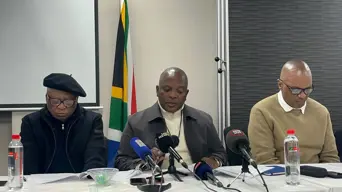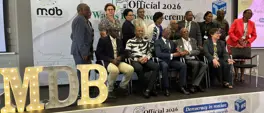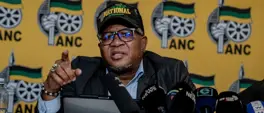ANDA BICI | Dismissing the National Dialogue betrays our struggle’s legacy
Anda Bici
17 June 2025 | 9:50ANC activist Anda Bici responds to Malaika Mahlatsi calling the National Dialogue a distraction, and says that calling it 'theatre' is to erase the very traditions of participatory struggle that transformed this country.

The task team appointed to prepare for the National Dialogue held a media briefing in Johannesburg on Friday, 13 June 2025, to explain the planning process. Picture: Alpha Ramushwana/EWN
I have read Malaika Mahlatsi’s recent article on the National Dialogue with both concern and disappointment. The claim that the National Dialogue is a distraction is not just inaccurate but deeply misguided. It betrays a troubling retreat into disillusionment, one that abandons the very democratic tools we need to resolve South Africa’s current legitimacy crisis.
To label dialogue a distraction is to ignore the fact that South Africa’s failures stem not from too much engagement, but from the lack of structured, accountable, and inclusive engagement. We have not failed because we spoke too much. We failed because we stopped listening, implementing, and including.
It is a false binary to frame dialogue and transformation as opposites. That framing is not radical but rather very reactionary. In fact, many of the gains Malaika and others now defend emerged from robust national dialogues such as Codesa, the TRC, the Freedom Charter, and even the HIV/AIDS turnaround.
To now dismiss dialogue as "theatre" is to erase the very traditions of participatory struggle that transformed this country.
Our country’s crisis today is a breakdown of trust between people and institutions. The National Dialogue is an attempt to re-anchor legitimacy through mass participation, not elite decree. We may critique its design, its limitations, or even its actors, but to dismiss it outright, without offering a detailed and viable alternative, is not intellectual clarity but a rhetorical despair.
What Malaika calls theatre is, in fact, an urgent call to restore a broken social contract. That process cannot be led by technocrats or old guard politicians alone. It must be driven by the very voices her article implicitly dismisses, rural women, informal workers, youth outside of power structures, movements beyond the headlines.
It is deeply ironic that one would urge transformation while denouncing democratic instruments that are constitutionally and morally necessary to achieve it. Worse still is the tone of elitism that surfaces when public participation is ridiculed as pointless coffee-shop talk. That is not critique but a troubling, untruthful alienation masked as an insight.
Malaika accuses the Dialogue of being a "distraction", yet offers no roadmap for traction. No mass organising strategy. No institutional reform model. No governance recovery plan.
That void is counterrevolutionary and hollow.
The truth is that a dialogue is not the enemy of transformation but its condition. We need more public deliberation. We need it tied to clear mandates, binding resolutions, and measurable implementation. What we don’t need is the growing tendency to shoot down democratic processes because they are imperfect. Everything is imperfect until we make it better.
It is precisely because our people seem tired of empty promises that the Dialogue must succeed. It must evolve, be reshaped, and be held to account but not be abandoned.
For those genuinely committed to transformation, the task is not to withdraw into cynicism, but to organise, shape, and demand better dialogues with enforceable outcomes.
Anda Bici is an ANC Activist
Get the whole picture 💡
Take a look at the topic timeline for all related articles.
Trending News
More in Opinion

5 December 2025 04:47
MANDY WIENER: Madlanga Inquiry reveals war between 'Hopedealers' and 'The Corrupt'

2 December 2025 12:00
TEGAN SNYMAN | Gender-based violence and femicide need to be treated as a true national crisis

1 December 2025 13:55
JAMIL F. KHAN | GNU era exposes that corruption has no race and no party boundaries














